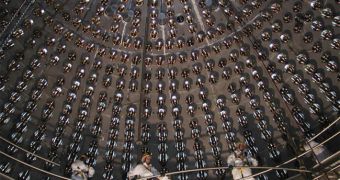A few weeks ago, researchers at a lab in Italy took the physics world by storm, when they proposed the existence of neutrinos capable of traveling faster than the speed of light. Now, scientists from the same lab – but with a different experiment – show the results to be false.
The initial measurements were released by a team of experts with the Oscillation Project with Emulsion-tRacking Apparatus (OPERA) experiment at the Gran Sasso National Laboratory (GSNL).
Physicists here measured the speed at which neutrinos generated by the CERN Large Hadron Collider (LHC) arrived at GSNL, and determined that elementary particles to travel the distance about 60 nanoseconds faster than photons.
If these results stand to scientific scrutiny, then this could mean that a huge portion of modern physics is wrong. Albert Einstein's theory of general relativity would also lose much of its shine, as the fact that light has the greatest speed in the Universe is one of its main tenets.
Now, researchers with the ICARUS (Imaging Cosmic and Rare Underground Signals) experiment – also at Gran Sasso – say that they were able to demonstrate an error in the OPERA results, which helps explain why their colleagues got the results they did.
Details of the new study are published online in the science journal arXiv. It holds that researchers at the GSNL should have observed a very significant deformation of the neutrino energy spectrum, if indeed these particles were traveling faster than light.
Additionally, the OPERA group should have also identified increased numbers of photons and e+e- pairs. Using data collected by ICARUS in 2010, also from the LHC neutrino beams, the second research team was able to demonstrate that no such variations were recorded.
Physicists with the ICARUS experiment also say that neutrino beams traveling faster than light should have lost some of their energy through the production of excess photons and e+e- pairs. This is not obvious in the data the detector collected.
In the group's analysis, the energy spectrum of the LHC neutrino beam is unaltered from expectations, proving that indeed no supraluminal (faster than light) events occurred. Scientists also show that the beams were not emitting coherent Cherenkov radiations.
The release of such radiations is expected to accompany any particle traveling at supraluminal speeds. In addition, the second team did not find any gamma-rays, which should have also been produced in such a scenario.
This is the second paper that proposes different interpretations for the OPERA results, after another research group indicated that small errors in the GPS satellites used to measure the distance between the GSNL and CERN may have been responsible for the readings.

 14 DAY TRIAL //
14 DAY TRIAL //